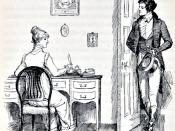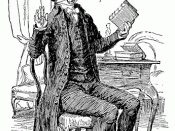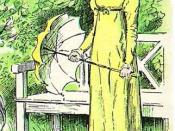Pride & Prejudice: Chapters 1 - 21
By Jamie Bennett
Jane Austen's Pride and Prejudice demonstrates that marriage is not always a result of love, but a convenient arrangement. Elizabeth and Jane Bennet strongly believe that one should marry for love, whereas Charlotte Lucas, Mr. Collins and Mrs. Bennet consider marriage to be a thing of practicality.
Elizabeth made her views of marriage very clear from early on in the book when discussing Jane and Mr. Bingley's growing attraction with Charlotte; she will only marry for love and not for status or practicality. "Your plan is a good one," replied Elizabeth, "where nothing is in question but the desire of being well married, and if I were determined to get a rich husband, or any husband, I dare say I should adopt it."
Elizabeth stayed true to her ideals of marriage later on when Mr. Collins proposed marriage. "I thank you again and again for the honour you have done me in your proposals, but to accept them is absolutely impossible.
My feelings in every respect forbid it." This offer of marriage would have been good for Elizabeth, if she had accepted it, as Collins would give her status, wealth and security; everything a marriage of practicality should provide. This marriage would have also pleased her mother to no end as it would mean that when the entailment of Longbourn occurred, she would not have to move out of her home as Mr. Collins and his wife moved in. However, Elizabeth rejected the notion of marrying for advantage and upheld the belief of marrying for love.
Collins' reasons for marriage were all about practicality, mixed with a feigned love, which Elizabeth, of course, saw straight through. "My reasons for marrying are, first, that I think it a right thing for...



One small thing..
I believe that you mean to say this novel is written by Jane Austen. But aside from that, pretty good.
2 out of 2 people found this comment useful.